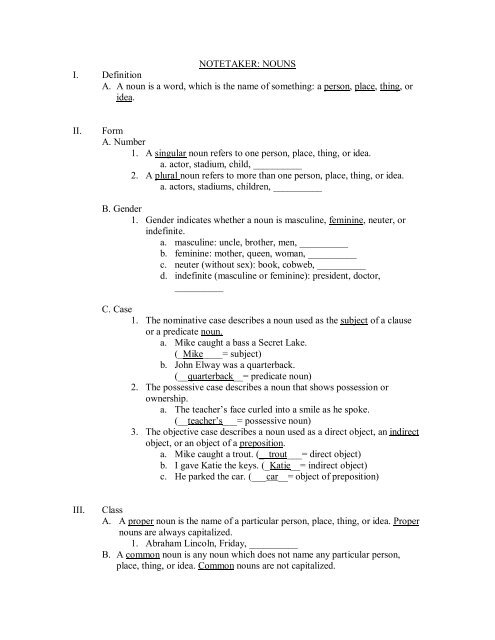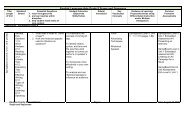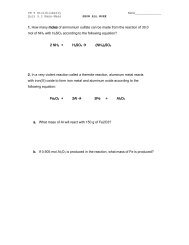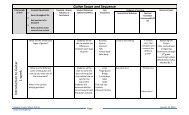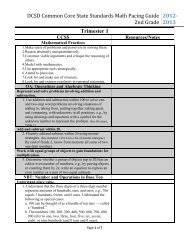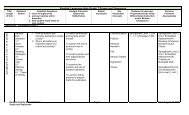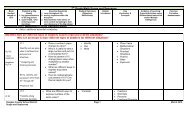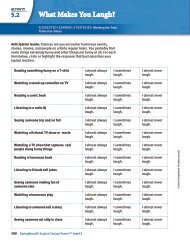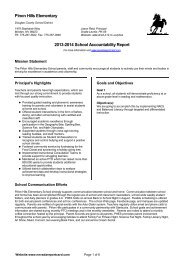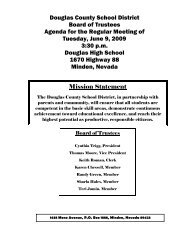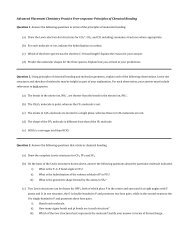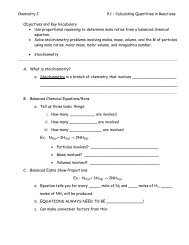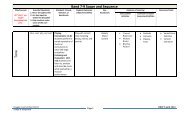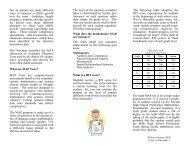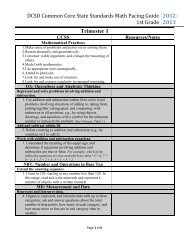NOUNS I. Definition A. A noun is a word, which is the name of ...
NOUNS I. Definition A. A noun is a word, which is the name of ...
NOUNS I. Definition A. A noun is a word, which is the name of ...
Create successful ePaper yourself
Turn your PDF publications into a flip-book with our unique Google optimized e-Paper software.
NOTETAKER: <strong>NOUNS</strong>I. <strong>Definition</strong>A. A <strong>noun</strong> <strong>is</strong> a <strong>word</strong>, <strong>which</strong> <strong>is</strong> <strong>the</strong> <strong>name</strong> <strong>of</strong> something: a person, place, thing, oridea.II.FormA. Number1. A singular <strong>noun</strong> refers to one person, place, thing, or idea.a. actor, stadium, child, __________2. A plural <strong>noun</strong> refers to more than one person, place, thing, or idea.a. actors, stadiums, children, __________B. Gender1. Gender indicates whe<strong>the</strong>r a <strong>noun</strong> <strong>is</strong> masculine, feminine, neuter, orindefinite.a. masculine: uncle, bro<strong>the</strong>r, men, __________b. feminine: mo<strong>the</strong>r, queen, woman, __________c. neuter (without sex): book, cobweb, __________d. indefinite (masculine or feminine): president, doctor,__________C. Case1. The nominative case describes a <strong>noun</strong> used as <strong>the</strong> subject <strong>of</strong> a clauseor a predicate <strong>noun</strong>.a. Mike caught a bass a Secret Lake.(_Mike____= subject)b. John Elway was a quarterback.(__quarterback__= predicate <strong>noun</strong>)2. The possessive case describes a <strong>noun</strong> that shows possession orownership.a. The teacher’s face curled into a smile as he spoke.(__teacher’s___= possessive <strong>noun</strong>)3. The objective case describes a <strong>noun</strong> used as a direct object, an indirectobject, or an object <strong>of</strong> a preposition.a. Mike caught a trout. (_ trout___= direct object)b. I gave Katie <strong>the</strong> keys. (_Katie__= indirect object)c. He parked <strong>the</strong> car. (___car__= object <strong>of</strong> preposition)III.ClassA. A proper <strong>noun</strong> <strong>is</strong> <strong>the</strong> <strong>name</strong> <strong>of</strong> a particular person, place, thing, or idea. Proper<strong>noun</strong>s are always capitalized.1. Abraham Lincoln, Friday, __________B. A common <strong>noun</strong> <strong>is</strong> any <strong>noun</strong> <strong>which</strong> does not <strong>name</strong> any particular person,place, thing, or idea. Common <strong>noun</strong>s are not capitalized.
1. child, winter, book, _________C. A concrete <strong>noun</strong> <strong>name</strong>s a thing that <strong>is</strong> tangible (can be heard, seen, smelled,tasted, and/or touched). Concrete <strong>noun</strong>s are ei<strong>the</strong>r common or proper.1. heard= thunder2. seen= book3. smelled= perfume4. tasted= soup5. touched= baseballD. An abstract <strong>name</strong>s an idea, a condition, or a feeling in o<strong>the</strong>r <strong>word</strong>s,something that cannot be heard, seen, smelled or tasted, and touched. Abstract<strong>noun</strong>s are ei<strong>the</strong>r common or proper.1. greed, poverty, love, peace, _________E. A collective <strong>noun</strong> <strong>name</strong>d a group or unit. Collective <strong>noun</strong>s are ei<strong>the</strong>r commonor proper.1. flock, class, faculty, _________F. A compound <strong>noun</strong> <strong>is</strong> a <strong>noun</strong> made up <strong>of</strong> two or more <strong>word</strong>s. Some compound<strong>noun</strong>s are written as one <strong>word</strong> (football), some as two <strong>word</strong>s (high school), oras a hyphenated <strong>word</strong> (bro<strong>the</strong>rinlaw).IV.The big pictureA. A <strong>noun</strong> phrase will lack a subject and/or verb, and it will function as a <strong>noun</strong>.1. Spotting <strong>the</strong> tiny mouse was easy for <strong>the</strong> hawk(__gerund_ phrase= subject)2. To shake every voter’s hand was <strong>the</strong> candidate’s goal.(__infinitive_ phrase= subject)B. A <strong>noun</strong> clause will have a subject and a verb, and it <strong>is</strong> used in place <strong>of</strong> a <strong>noun</strong>.1. The teacher said that <strong>the</strong> essay questions are based only on <strong>the</strong> lasttwo chapters. (direct object)


